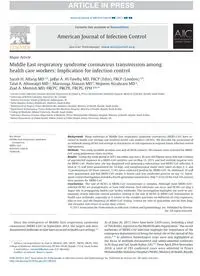
2017 Middle East respiratory syndrome coronavirus transmission among health care workers_ Implication for infection cont PDF
Preview 2017 Middle East respiratory syndrome coronavirus transmission among health care workers_ Implication for infection cont
Major Article Middle East respiratory syndrome coronavirus transmission among health care workers: Implication for infection control Sarah H. Alfaraj MD a,b, Jaffar A. Al-Tawfiq MD, FRCP (Edin), FRCP (London) c,d, Talal A. Altuwaijri MD e, Marzouqa Alanazi MD f, Nojoom Alzahrani MD a, Ziad A. Memish MD, FRCPC, FRCPE, FRCPL, FPH g,h,i,* a Corona Center, Infectious Diseases Division, Department of Pediatric, Prince Mohamed Bin Abdulaziz Hospital, Ministry of Health, Riyadh, Saudi Arabia b University of British Columbia, Vancouver, BC, Canada c Indiana University School of Medicine, Indianapolis, IN d Johns Hopkins Aramco Healthcare, Dhahran, Saudi Arabia e Department of Surgery, Prince Mohamed Bin Abdulaziz Hospital, Ministry of Health, Riyadh, Saudi Arabia f Department of Emergency, Prince Mohamed Bin Abdulaziz Hospital, Ministry of Health, Riyadh, Saudi Arabia g College of Medicine, Alfaisal University, Riyadh, Saudi Arabia h Infectious Diseases Division, Department of Medicine, Prince Mohamed Bin Abdulaziz Hospital, Ministry of Health, Riyadh, Saudi Arabia i Hubert Department of Global Health, Rollins School of Public Health, Emory University, Atlanta, GA Key Words: Middle East respiratory syndrome coronavirus MERS-CoV Infection control Outbreak Background: Many outbreaks of Middle East respiratory syndrome coronavirus (MERS-CoV) have oc- curred in health care settings and involved health care workers (HCWs). We describe the occurrence of an outbreak among HCWs and attempt to characterize at-risk exposures to improve future infection control interventions. Methods: This study included an index case and all HCW contacts. All contacts were screened for MERS- CoV using polymerase chain reaction. Results: During the study period in 2015, the index case was a 30-year-old Filipino nurse who had a history of unprotected exposure to a MERS-CoV–positive case on May 15, 2015, and had multiple negative tests for MERS-CoV. Weeks later, she was diagnosed with pulmonary tuberculosis and MERS-CoV infection. A total of 73 staff were quarantined for 14 days, and nasopharyngeal swabs were taken on days 2, 5, and 12 postexposure. Of those contacts, 3 (4%) were confirmed positive for MERS-CoV. An additional 18 staff were quarantined and had MERS-CoV swabs. A fourth case was confirmed positive on day 12. Subse- quent contact investigations revealed a fourth-generation transmission. Only 7 (4.5%) of the total 153 contacts were positive for MERS-CoV. Conclusions: The role of HCWs in MERS-CoV transmission is complex. Although most MERS-CoV– infected HCWs are asymptomatic or have mild disease, fatal infections can occur and HCWs can play a major role in propagating health care facility outbreaks. This investigation highlights the need to con- tinuously review infection control guidance relating to the role of HCWs in MERS-CoV transmission in health care outbreaks, especially as it relates to the complex questions on definition of risky exposures, who to test, and the frequency of MERS-CoV testing; criteria for who to quarantine and for how long; and clearance and return to active duty criteria. © 2017 Association for Professionals in Infection Control and Epidemiology, Inc. Published by Elsevier Inc. All rights reserved. Since the emergence of Middle East respiratory syndrome coronavirus (MERS-CoV) in September 2012, the largest and most documented outbreaks to date have occurred in health care settings.1-6 As of June 26, 2017, there have been 2,029 cases, including a total of 704 deaths, reported to the World Health Organization.7 The recent outbreaks of MERS-CoV infection highlight the importance of the emergency departments in being the initial site of the spread of this virus.8-12 In addition, hemodialysis units were also highlighted as the focus of multiple documented and undocumented outbreaks in Al-Hasa and Taif, Saudi Arabia (SA).5,13 From April 2014-November 2016, a total of 295 confirmed cases were admitted to Prince Mohamed Bin Abdulaziz Hospital (PMAH), Ministry of Health, Riyadh, * Address correspondence to Ziad A. Memish, MD, FRCPC, FRCPE, FRCPL, FPH, College of Medicine, Alfaisal University, PO Box 54146, Riyadh 11514, Saudi Arabia. E-mail address:
